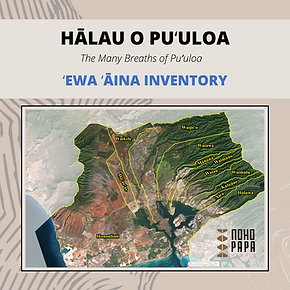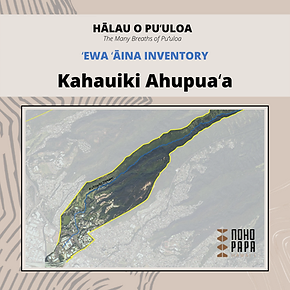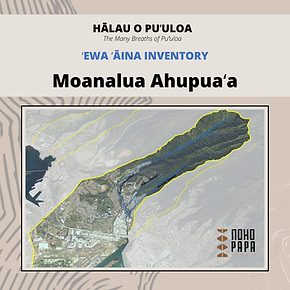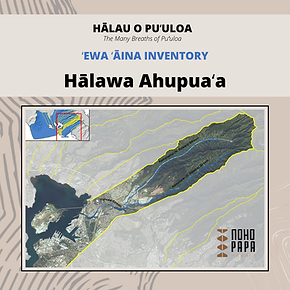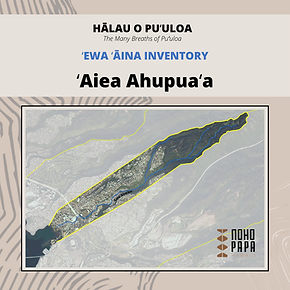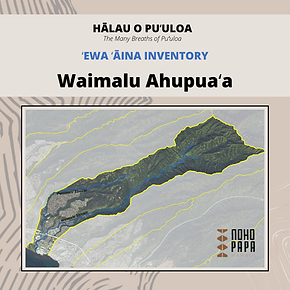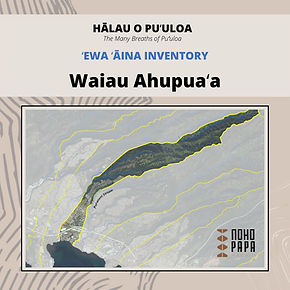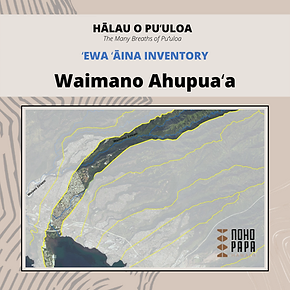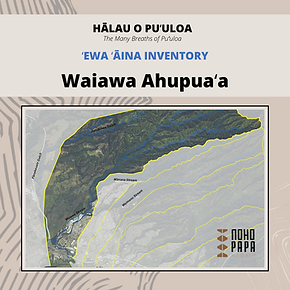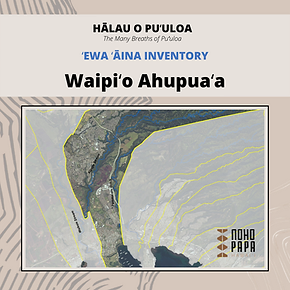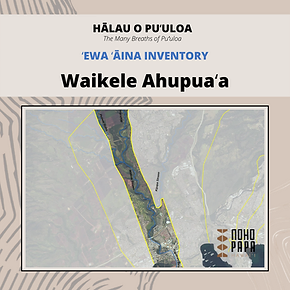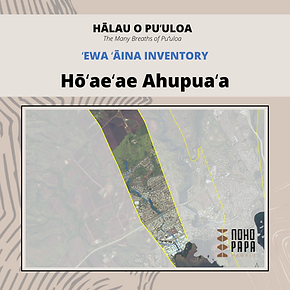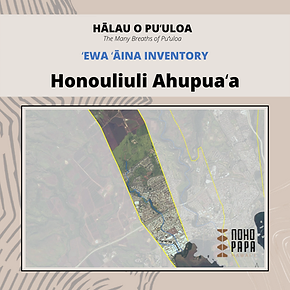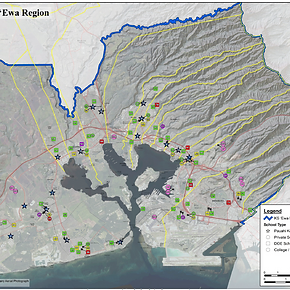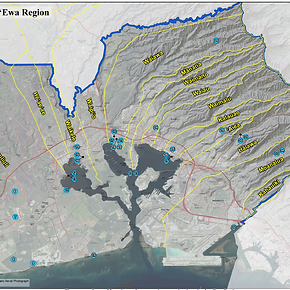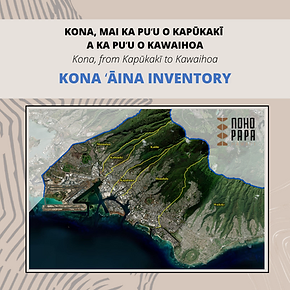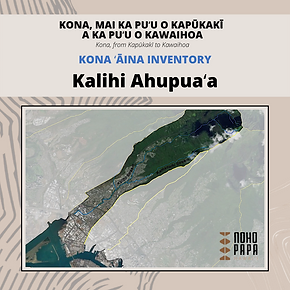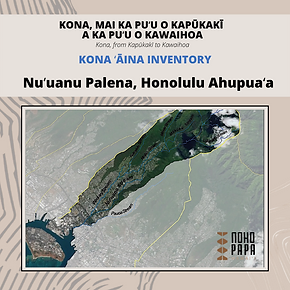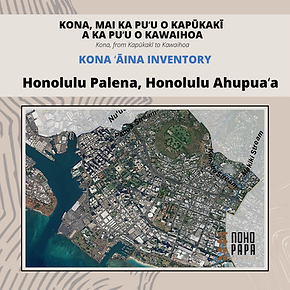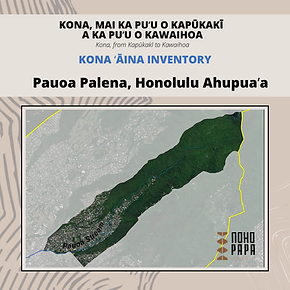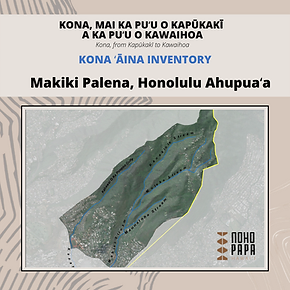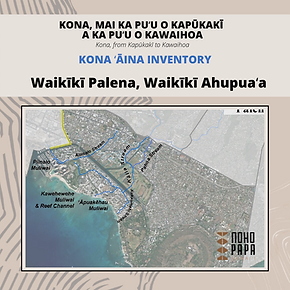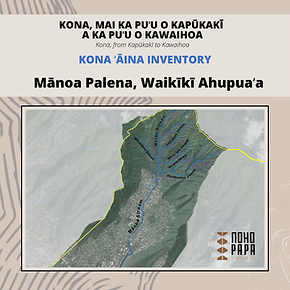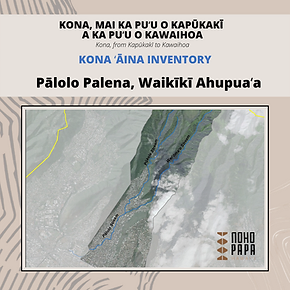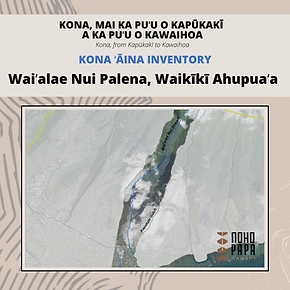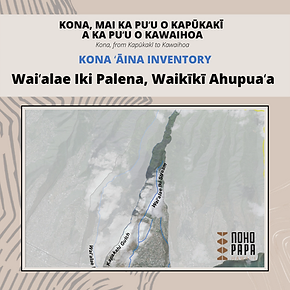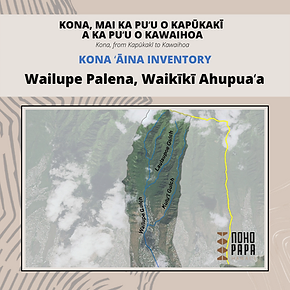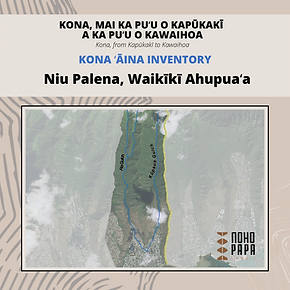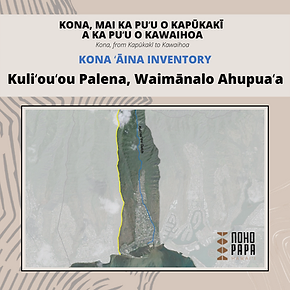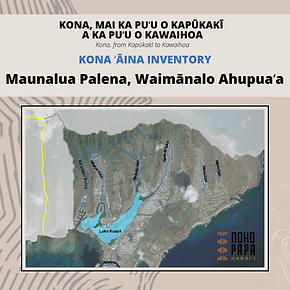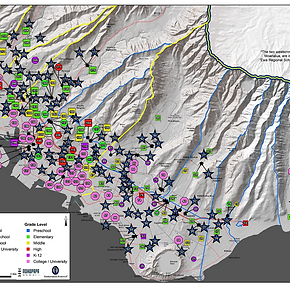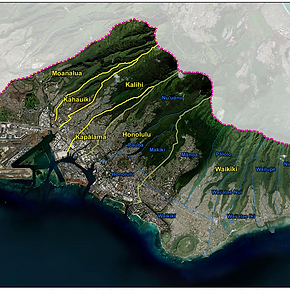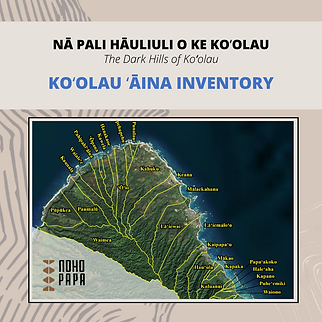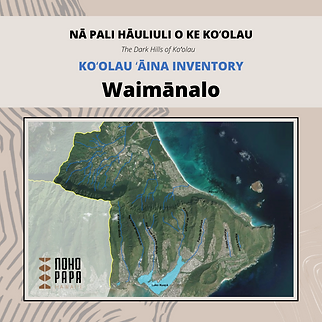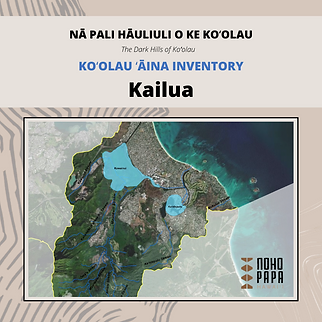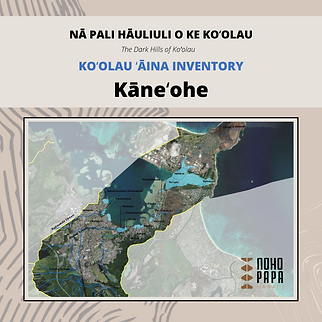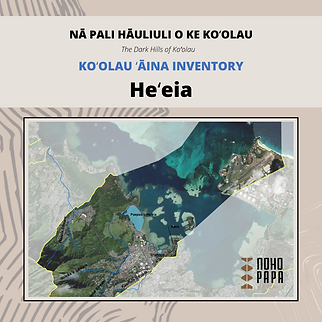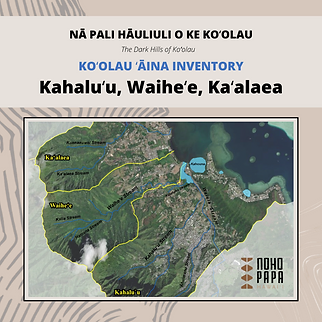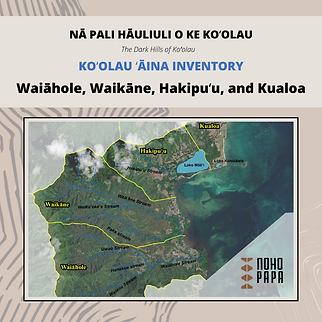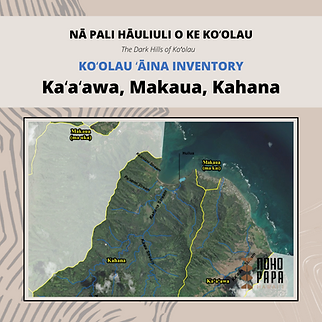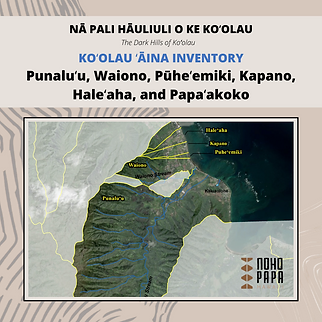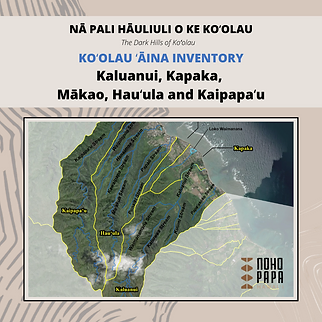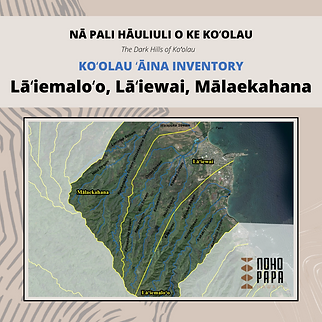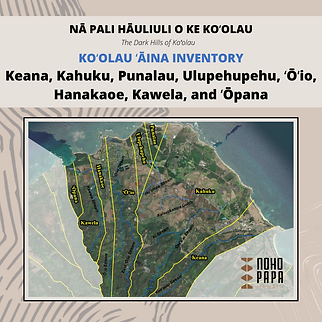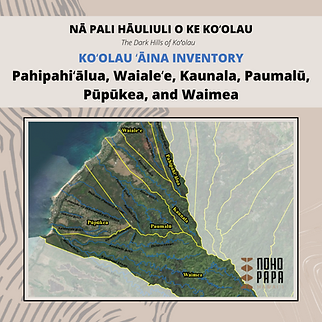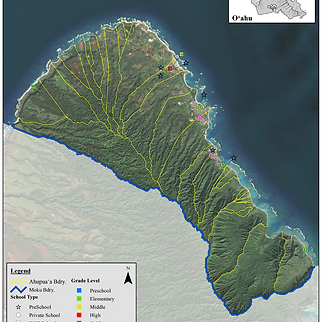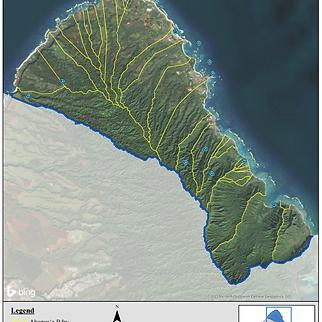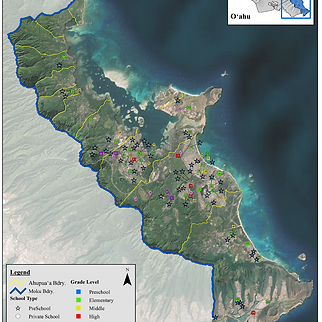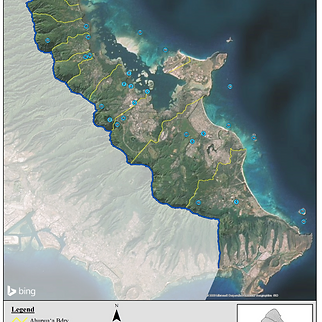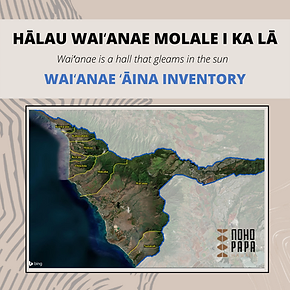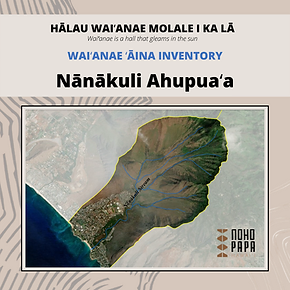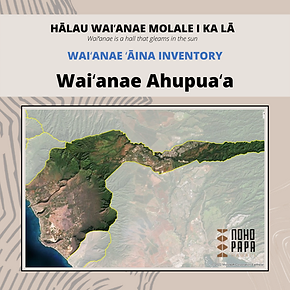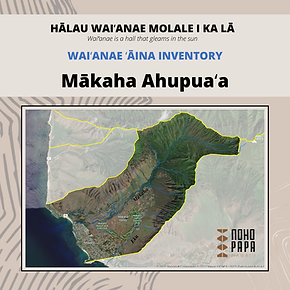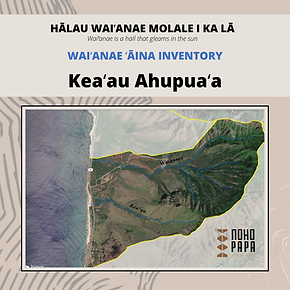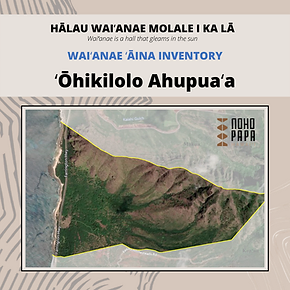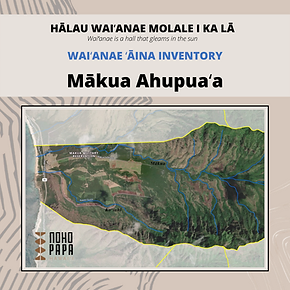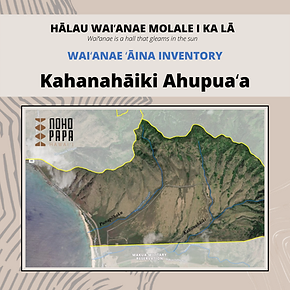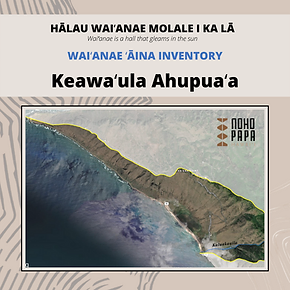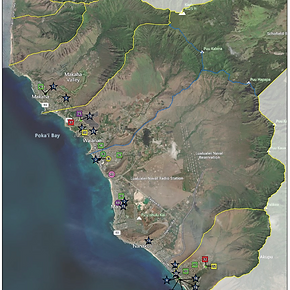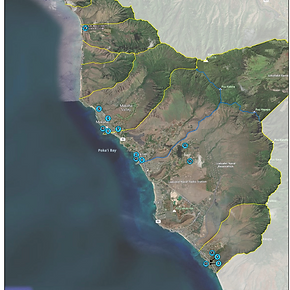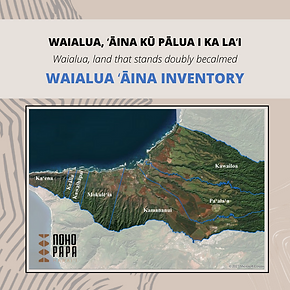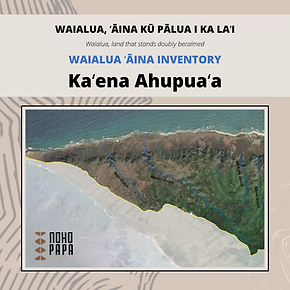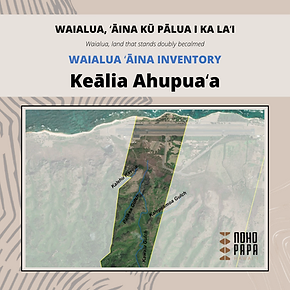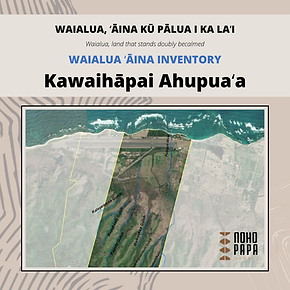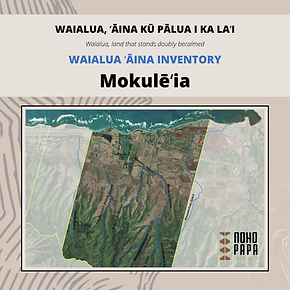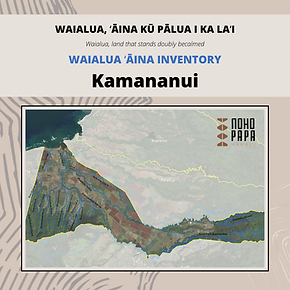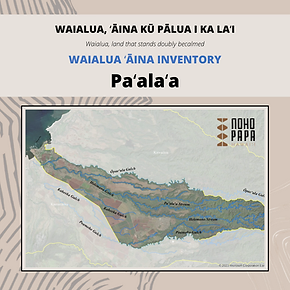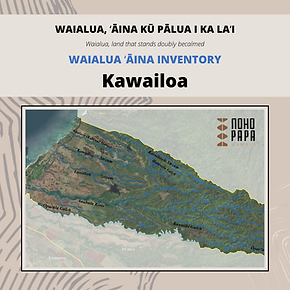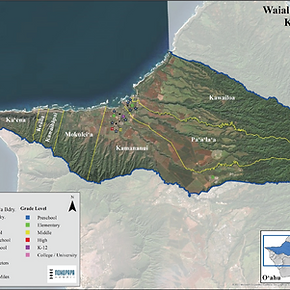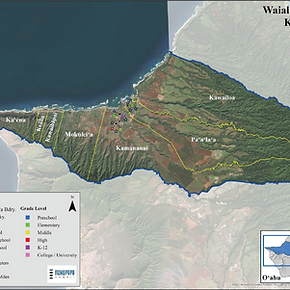‘Ewa Moku, O‘ahu
Nohopapa Hawai‘i worked with Kamehameha Schools on an innovative ‘Āina Inventory that incorporates a synthesis of historical research, ethnographic information, wahi pana data, and the current stewardship and restoration efforts taking place in the moku to create a richer understanding of ‘Ewa’s historical and contemporary cultural landscape. The inventory supports the development of collaborative and innovative strategies to increase availability and access to quality Āina Based Education (ABE) & Hawaiian Culture Based Education (HCBE) educational opportunities for learners in the region. The ‘Āina Inventory also helps support the development of ABE & HCBE curriculum and create processes to build a shared community sense of place. As described and defined by KS-CE&R, the unit of analysis for this inventory is based not only on traditional Hawaiian land divisions, but also on Department of Education (DOE) and census districts. Consequently, this study—and the ‘Ewa Region as defined by KS-CE&R—includes all or most of the 12 traditional ahupua‘a of ‘Ewa Moku (from west to east -- Honouliuli, Hō‘ae‘ae, Waikele, Waipi‘o, Waiawa, Mānana, Waimano, Waiau, Waimalu, Kalauao, ‘Aiea and Hālawa) as well as the entire ahupua‘a of Moanalua and Kahauiki in Kona Moku (Honolulu District).
Resources in this collection:
‘Ewa ‘Āina Inventory
Summary: Hawaiian cultural landscape of ‘Ewa Moku, mo‘olelo, selected wahi pana, and community groups.
Kahauiki Ahupua‘a
Summary: Hawaiian cultural landscape of Kahauiki, mo‘olelo, selected wahi pana, and community groups.
Moanalua Ahupua‘a
Summary: Hawaiian cultural landscape of Moanalua, mo‘olelo, selected wahi pana, and community groups.
Hālawa Ahupua‘a
Summary: Hawaiian cultural landscape of Hālawa, mo‘olelo, selected wahi pana, and community groups.
‘Aiea Ahupua‘a
Summary: Hawaiian cultural landscape of ‘Aiea, mo‘olelo, selected wahi pana, and community groups.
Kalauao Ahupua‘a
Summary: Hawaiian cultural landscape of Kalauao, mo‘olelo, selected wahi pana, and community groups.
Waimalu Ahupua‘a
Summary: Hawaiian cultural landscape of Waimalu, mo‘olelo, selected wahi pana, and community groups.
Waiau Ahupua‘a
Summary: Hawaiian cultural landscape of Waiu, mo‘olelo, selected wahi pana, and community groups.
Waimano Ahupua‘a
Summary: Hawaiian cultural landscape of Waimano, mo‘olelo, selected wahi pana, and community groups.
Mānana Ahupua‘a
Summary: Hawaiian cultural landscape of Mānana, mo‘olelo, selected wahi pana, and community groups.
Waiawa Ahupua‘a
Summary: Hawaiian cultural landscape of Waiawa, mo‘olelo, selected wahi pana, and community groups.
Waipi‘o Ahupua‘a
Summary: Hawaiian cultural landscape of Waipi‘o, mo‘olelo, selected wahi pana, and community groups.
Waikele Ahupua‘a
Summary: Hawaiian cultural landscape of Waikele, mo‘olelo, selected wahi pana, and community groups.
Hō‘ae‘ae Ahupua‘a
Summary: Hawaiian cultural landscape of Hō‘ae‘ae, mo‘olelo, selected wahi pana, and community groups.
Honouliuli Ahupua‘a
Summary: Hawaiian cultural landscape of Honouliuli, mo‘olelo, selected wahi pana, and community groups.
‘Ewa Kula Map
Summary: Map of general locations of community organizations in the ‘Ewa Region (Last updated: 1.19.2019).
‘Ewa Community Sites Map
Summary: Map of General locations of community organizations in the ‘Ewa Region. (Last updated: 1.19.2019).
Kona Moku, O‘ahu
Nohopapa Hawai‘i worked with Kamehameha Schools on an innovative ‘Āina Inventory that incorporates a synthesis of historical research, ethnographic information, wahi pana data, and the current stewardship and restoration efforts taking place in the moku to create a richer understanding of Kona‘s historical and contemporary cultural landscape. The inventory supports the development of collaborative and innovative strategies to increase availability and access to quality Āina Based Education (ABE) & Hawaiian Culture Based Education (HCBE) educational opportunities for learners in the region. The Kona ‘Āina Inventory also helps support the development of ABE & HCBE curriculum and create processes to build a shared community sense of place. For this project, because we believe the audience and users of this study will find it more useful, we have chosen to divide the five ahupua‘a in KS’ Kona, O‘ahu Region (Kalihi, Kapālama, Honolulu, Waikīkī and a portion of Waimānalo) into 15 palena that follow the 1880s Hawaiian Government Survey. These divisions are smaller than the Hawai‘i state GIS ahupua‘a divisions, but more closely reflect traditional concepts of land divisions in Kona Moku.
Resources in this collection:
Kona ‘Āina Inventory
Summary: Hawaiian cultural landscape of Kona Moku, mo‘olelo, selected wahi pana, and community groups.
Kalihi Ahupua‘a
Summary: Hawaiian cultural landscape of Kahili, mo‘olelo, selected wahi pana, and community groups.
Kapālama Ahupua‘a
Summary: Hawaiian cultural landscape of Kapālama, mo‘olelo, selected wahi pana, and community groups.
Nu‘uanu Ahupua‘a
Summary: Hawaiian cultural landscape of Nu‘uanu, mo‘olelo, selected wahi pana, and community groups.
Ko‘olaupoko and Ko‘olauloa Moku, O‘ahu
Nohopapa Hawai‘i worked with Kamehameha Schools on an innovative ‘Āina Inventory that incorporates a synthesis of historical research, ethnographic information, wahi pana data, and the current stewardship and restoration efforts taking place in the moku to create a richer understanding of Ko‘olauloa and Ko‘olaupoko's historical and contemporary cultural landscape. The inventory supports the development of collaborative and innovative strategies to increase availability and access to quality Āina Based Education (ABE) and Hawaiian Culture Based Education (HCBE) educational opportunities for learners in the region. The ‘Āina Inventory also helps support the development of ABE and HCBE curriculum and create processes to build a shared community sense of place. Within the moku of Ko‘olaupoko, the eleven ahupua‘a named in this study (that stretch from Waimānalo to Kualoa) form a continuous coastal plain and are renowned for tall-peaked mountains and an abundance of freshwater. Whereas, within the moku Ko‘olauloa, the thirty-two ahupua‘a named in this study (that stretch from Ka‘a‘awa to Waimea) are characterized by low mountains, deep valleys, and a narrow coastline.
Resources in this collection:
Ko‘olau ‘Āina Inventory
Summary: Hawaiian cultural landscape of both the Moku of Ko‘olauloa and Ko‘olaupoko, mo‘olelo, selected wahi pana, and community groups.
Waimānalo Ahupua‘a
Summary: Hawaiian cultural landscape of Waimānalo Ahupua‘a, mo‘olelo, selected wahi pana, and community groups.
Kailua Ahupua‘a
Summary: Hawaiian cultural landscape of Kailua Ahupua‘a, mo‘olelo, selected wahi pana, and community groups.
Kāne‘ohe Ahupua‘a
Summary: Hawaiian cultural landscape of Kāne‘ohe Ahupua‘a, mo‘olelo, selected wahi pana, and community groups.
He‘eia Ahupua‘a
Summary: Hawaiian cultural landscape of He‘eia Ahupua‘a, mo‘olelo, selected wahi pana, and community groups.
Punalu‘u, Waiono, Pūhe‘emiki, Kapano, Hale‘aha, and Papa‘akoko Ahupua‘a
Summary: Hawaiian cultural landscape of Punalu‘u Waiono, Pūhe‘emiki, Kapano, Hale‘aha and Papa‘akoko, mo‘olelo, selected wahi pana, and community groups.
Kaluanui, Kapaka, Mākao, Hau‘ula, and Kaipapa‘u Ahupua‘a
Summary: Hawaiian cultural landscape of Kaluanui, Kapaka, Mākao, Hau‘ula and Kaipapa‘u Ahupua‘a, mo‘olelo, selected wahi pana, and community groups.
Keana, Kahuku, Punalau, Ulupehupehu, ‘Ō‘io, Hanakaoe, Kawela, and ‘Ōpana Ahupua‘a
Summary: Hawaiian cultural landscape of Keana, Kahuku, Punalau, Ulupehupehu, ‘Ō‘io, Hanakaoe, Kawela and ‘Ōpana mo‘olelo, selected wahi pana, and community groups.
Pahipahi‘ālua, Waiale‘e, Kaunala, Paumalū, Pūpūkea, and Waimea Ahupua‘a
Summary: Hawaiian cultural landscape of Pahipahu‘ālua, Waiale‘e, Kaunala, Paumalū, Pupukea, and Waimea Ahupua‘a mo‘olelo, selected wahi pana, and community groups.
Ko‘olauloa Moku Community Map
Summary: Map of general locations of the community hui (groups) work sites and/or office sites (Last Updated 5.16.2023).
Ko‘olaupoko Moku Community Map
Summary: Map of general locations of the community hui (groups) work sites and/or office sites (Last Updated 5.16.2023).
Wai‘anae Moku, O‘ahu
At the request of Papa Ola Lōkahi, Nohopapa Hawai‘i, LLC undertook this study whose overall goal was to inventory the Wai‘anae moku on the island of O‘ahu; with this initial research laying the kahua, or foundation, for future work. It is through aloha, and in this case aloha ‘āina, that life can be restored and invigorated for both the wahi ho‘ōla and for all of us who revere and benefit from these sites. In addition to the Inventory, Nohopapa looked at specific focus sites within the Wai‘anae moku. These sites include Kū‘īlioloa Heiau, Kamaile Heiau, Pu‘u Kawiwi in the ahupua‘a of Wai‘anae, as well as Kūkaniloko in Wai‘anae Uka/ Wahiawā. It is hoped that the wahi ho‘ōla, such as those documented in this report, can be physically restored, stewarded, and maintained as vibrant houses-of-life for their respective communities.
Resources in this collection:
Wai‘anae ‘Āina Inventory
Summary: Hawaiian cultural landscape of Wai‘anae Moku, mo‘olelo, selected wahi kūpuna, and community groups.
Nānākuli Ahupua‘a
Summary: Hawaiian cultural landscape of Nānākuli, mo‘olelo, selected wahi kūpuna, and community groups.
Wai‘anae Ahupua‘a
Summary: Hawaiian cultural landscape of Wai‘anae, mo‘olelo, selected wahi kūpuna, and community groups.
Mākaha Ahupua‘a
Summary: Hawaiian cultural landscape of Mākaha, mo‘olelo, selected wahi kūpuna, and community groups.
Kea‘au Ahupua‘a
Summary: Hawaiian cultural landscape of Kea‘au, mo‘olelo, selected wahi kūpuna, and community groups.
‘Ōhikiloko Ahupua‘a
Summary: Hawaiian cultural landscape of ‘Ōhikilolo, mo‘olelo, selected wahi kūpuna, and community groups
Mākua Ahupua‘a
Summary: Hawaiian cultural landscape of Mākua, mo‘olelo, selected wahi kūpuna, and community groups.
Kahanahāiki Ahupua‘a
Summary: Hawaiian cultural landscape of Kahanahāiki, mo‘olelo, selected wahi kūpuna, and community groups.
Keawa‘ula Ahupua‘a
Summary: Hawaiian cultural landscape of Keawa‘ula, mo‘olelo, selected wahi kūpuna, and community groups.
Waialua Moku, Oʻahu
Nohopapa Hawaiʻi worked with Kamehameha Schools on an innovative ‘Āina Inventory that incorporates a synthesis of historical research, ethnographic information, wahi pana data, and the current stewardship and restoration efforts taking place in the moku to create a richer understanding of Waialua's historical and contemporary cultural landscape. The inventory will support the development of collaborative and innovative strategies to increase availability and access to quality Āina Based Education (ABE) and Hawaiian Culture Based Education (HCBE) educational opportunities for learners in the region. The ‘Āina Inventory will also help support the development of ABE and HCBE curriculum and create processes to build a shared community sense of place.
Resources in this collection:
Waialua ‘Āina Inventory
Summary: Hawaiian cultural landscape of Waialua Moku, mo‘olelo, selected wahi pana, and community groups.
Ka‘ena Ahupua‘a
Summary: Hawaiian cultural landscape of Ka‘ena, mo‘olelo, selected wahi pana, and community groups.
Keālia Ahupua‘a
Summary: Hawaiian cultural landscape of Keālia, mo‘olelo, selected wahi pana, and community groups.
Kawaihāpai Ahupua‘a
Summary: Hawaiian cultural landscape of Kawaihāpai, mo‘olelo, selected wahi pana, and community groups.
Mokulē‘ia Ahupua‘a
Summary: Hawaiian cultural landscape of Mokulē‘ia, mo‘olelo, selected wahi pana, and community groups.
Kamananui Ahupua‘a
Summary: Hawaiian cultural landscape of Kamananui, mo‘olelo, selected wahi pana, and community groups.
Pa‘ala‘a Ahupua‘a
Summary: Hawaiian cultural landscape of Pa‘ala‘a, mo‘olelo, selected wahi pana, and community groups.
Kawailoa Ahupua‘a
Summary: Hawaiian cultural landscape of Kawailoa, mo‘olelo, selected wahi pana, and community groups.










